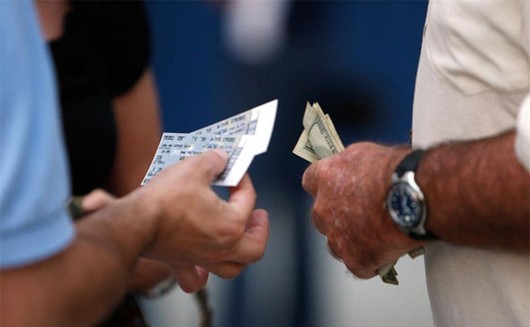For Tim Kelly, the principle is simple: If someone buys a ticket to an event, it’s up to that person what to do with it.
So the Republican state representative from Michigan introduced House Bill 5108 last year to end a prohibition on scalping tickets that goes back to 1931. The bill was referred to a committee in March of 2014 and Kelly said he doesn’t expect it to get out unless the public demands it be put to a vote.
According to the state’s House Fiscal Agency, “Anecdotally, it doesn’t appear that the prohibition against ticket scalping (especially in cases where the tickets are initially obtained through legitimate means) is enforced to any great degree.”
“Either prosecute everybody or don’t prosecute anybody,” Kelly said. “Right now, it’s a government-sanctioned monopoly. If somebody buys a ticket, it should be to do whatever they please.”
Powerful Opposition
However, there’s a lot of opposition to his bill.
Casinos, Michigan State University, University of Michigan, all the Detroit professional sports venues, and even a circus came out against the legislation. Their concern is big-time scalpers who can buy a large number of tickets and then resell them at a much higher price.
The Broadway League, a national trade association that represents theaters across the country, including Michigan State University’s Wharton Center, also came out against the legislation.
Tom Ferrugia, director of government relations for The Broadway League, said his organization’s main concern regards businesses that exist solely to resell tickets. Those businesses sometimes aren’t transparent with the pricing of tickets or can misrepresent tickets they are reselling. In some instances, consumers may not be aware if they go on a third-party Web site they may be paying a very high mark-up for a ticket, he said.
Transparency and Control
Some venues report angry customers who were misled by a third-party Web site, Ferrugia said.
The Broadway League supports legislation requiring third-party disclosure for customers, he said. Venues should maintain control of their event’s tickets, he said, adding there is no problem if a venue decides to enter a relationship with a ticket vendor.
One way for a venue to maintain control of its ticket distribution is to have customers sign an agreement stating they are not a ticket broker and won’t sell the ticket for a specified dollar amount above the face value, he said. If that agreement is violated, the sale could be rescinded.
Mark Perry, a University of Michigan-Flint professor of economics, laid out what he thought was unfair about the current scalping law in an op-ed in the Lansing State Journal. Perry said sites like Ticketmaster and StubHub sign deals with teams and venues that allow them exclusive right to resell tickets. In exchange, the teams and venues receive a portion of the scalping revenue.
The law requires someone wanting to resell their ticket at higher than face value to have written consent from the artist, team or venue, Perry said.
Market Efficiency Mechanism
Antony Davies, an associate professor of economics at Duquesne University in Pittsburgh, said scalping is the market’s way of fixing a serious inefficiency. He said the demand for some events can be so great, tickets will sell out within a few hours.
“In the absence of scalping, you have to show up early [for some events, days early] and camp out,” Davies said “Suppose you need to arrive 24 hours early to get a ticket. If your time is worth, for example, $10 per hour then camping out for those 24 hours cost you $240 in time and energy – time and energy that you could have devoted to other things. So, in total, the ticket cost you $250 . . . When you pay a scalper $250 for a ticket, you aren’t getting ‘ripped off.’ Instead, you have the ability to pay $250 cash for the ticket instead of a combination of $10 cash and $240 in time and effort.”




